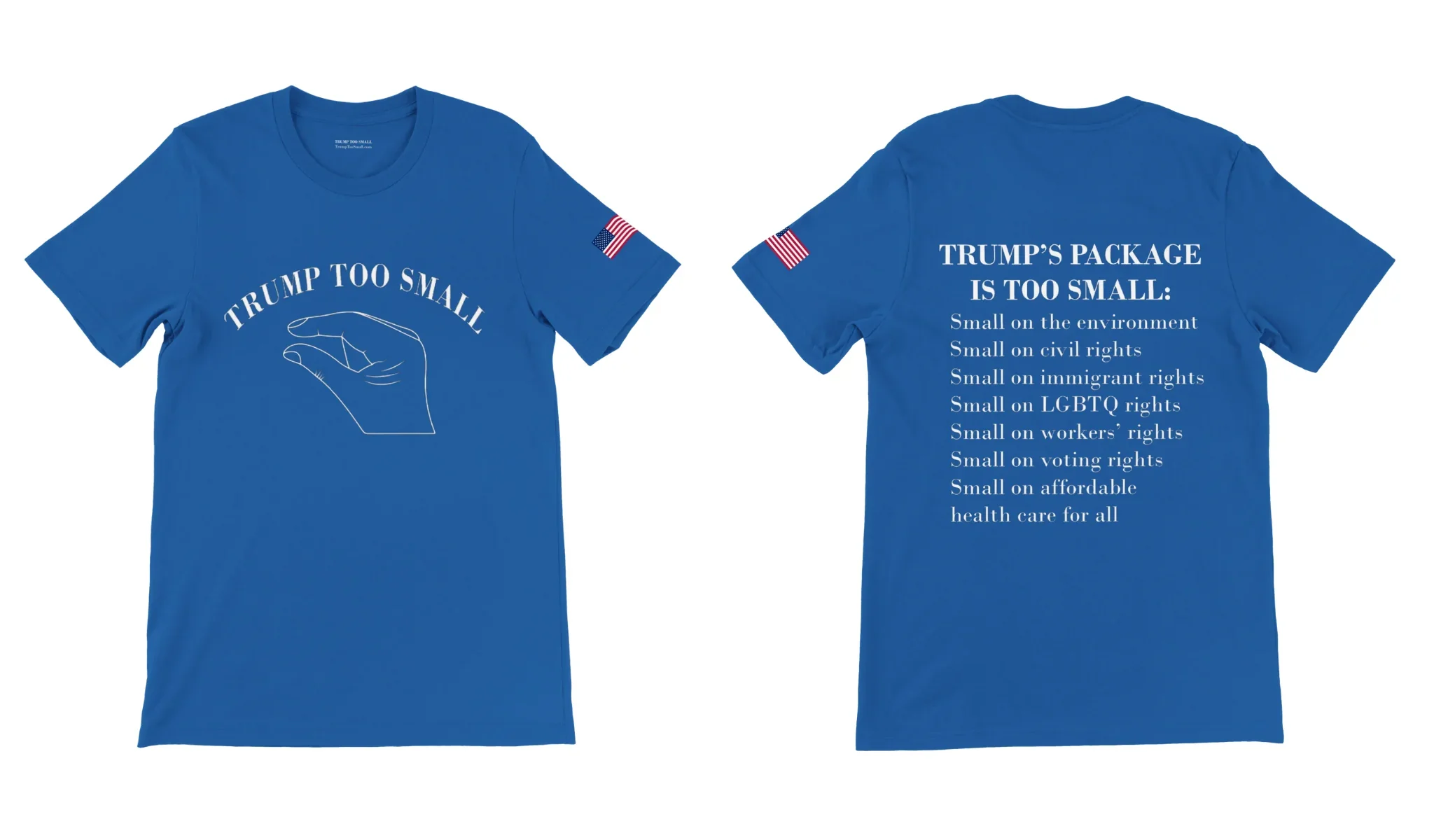‘Trump too small’ t-shirt Supreme Court case shows size does matter
At the centre of a case before the Supreme Court is the validity of trademarking an insult directed at former president Donald Trump
How small are Donald Trump’s hands?
Apparently, small enough to warrant selling t-shirts mocking them but too big to trademark – at least that’s the gist of the argument the US government is making in the Supreme Court case Vidal v Elster.
In a case with a highly unusual backstory, the nine justices are being asked to decide if a section of US trademark law that prohibits trademarking a person’s name without their consent is actually a violation of the First Amendment.
More specifically, they’re talking about the phrase: “TRUMP TOO SMALL”.
The case comes amid a jam-packed term for the court, which will hear cases concerning government censorship of social media, gun rights and racial gerrymandering. The Trump trademark case may not be the most consequential, but it illustrates the ongoing impact of the 45th president.
The case’s precedent appears to deliver a relatively straightforward answer to the question being presented:
“Whether the refusal to register a mark under Section 1052(c) violates the Free Speech Clause of the First Amendment when the mark contains criticism of a government official or public figure.”
To better understand the case requires a step back to 2016, when Florida Senator Marco Rubio was campaigning against Mr Trump in the presidential election.
While speaking to voters at an event, Mr Rubio joked that Mr Trump had “small hands” – an apparent innuendo to Mr Trump’s manhood.
“You know what they say about men with small hands,” Mr Rubio said. “You can’t trust them.”
Subsequently, Mr Trump vigorously defended himself, and the infamous Trump’s-hands-are-too-small debate lived on.
Steve Elster, a lawyer from California and Democratic advocate, saw a clear connection between Mr Trump’s hand narrative and his political views.
“If he’s going to make the size of his features a political issue, well that’s now clearly a topic for political discussion,” Mr Elster said in an interview with Law.com earlier this year.
So in 2018, Mr Elster decided to make and sell t-shirts with the words “TRUMP TOO SMALL” that featured an image of a hand making a small gesture.
The back of the shirt bares the phrase “TRUMP’S PACKAGE IS TOO SMALL” with a list of Mr Trump’s “small” agenda including LGBT+ rights, civil rights, the environment and more.

Mr Elster applied to trademark “TRUMP TOO SMALL” but the US Patent and Trademark Office (USPTO) denied his application, claiming it violated their rules against trademarking a public official’s name.
Under Section 2 of the Lanham Act, a trademark can be refused if it “consists of or comprises a name, portrait, or signature identifying a particular living individual except by his written consent” and if it “may disparage or falsely suggest a connection with persons.”
The USPTO argued that “TRUMP” was synonymous with the then-president, so for the mark to be approved, Mr Elster would need written consent from Mr Trump, which was likely not happening.
Mr Elster disputed the decision, claiming that by denying the trademark the USPTO violated his First Amendment right to criticise the government.
But the USPTO Trademark Trial and Appeal Board stood firm in their decision. After the US Court of Appeals agreed with Mr Elster last year, the US Solicitor General requested the Court take up the case.
During Wednesday morning’s oral arguments, it appeared the justices weren’t that divided over the matter.
Justices Clarence Thomas, Sonia Sotomayor and Ketanji Brown Jackson all questioned how the refusal to approve a trademark application violates the First Amendment if Mr Elster was still permitted to print the shirts and sell them.
“He can sell as many shirts with this saying and the government’s not telling him he can’t use the phrase, he can’t sell it anywhere he wants,” Justice Sotomayor said. “There’s no limitation on him selling it. So there’s no traditional infringement.”
Jonathan Taylor, the attorney representing Mr Elster, argued that famous people, like Mr Trump, were less likely to approve trademarks if they conveyed a negative message about themselves which “burdens” free speech – aka viewpoint-based discrimination.
“The government’s interest in discouraging marks because they hurt the feeling of public figures has nothing to do with the purpose of trademark registration,” Mr Taylor said.
Mr Taylor argued that by not extending Mr Elster the right to trademark his “TRUMP TOO SMALL” merchandise, the USPTO was burdening his right to free speech.
But the justices challenged the argument – seemingly with growing agitation.
“If your argument is that somehow your speech is being impeded it would be good to know precisely how it’s being impeded or burdened,” Mr Thomas said after a short back-and-forth.
At one point, Justice Elena Kagen asked Mr Taylor to cite a case supporting his argument that the government cannot make benefits viewpoint neutral.
When Mr Taylor could not, Justice Kagen shot back, “I can” and listed several where the court said the opposite.
Justice Jackson also pointed out that there were examples of notable individuals refusing to give their consent to trademarks that didn’t invoke negative connotations – unlike the “TRUMP TOO SMALL” shirt.
She asked Mr Taylor for “data” showing otherwise. He was unable to provide it.
By the end of the arguments, it seemed clear that most of the justices were unconvinced Section 2 was unconstitutional and had many precedents to draw on to support this.
And yet, for approximately an hour and a half on Wednesday, they entertained an idea entirely based around Mr Trump’s “too small” hands.

Join our commenting forum
Join thought-provoking conversations, follow other Independent readers and see their replies
Comments